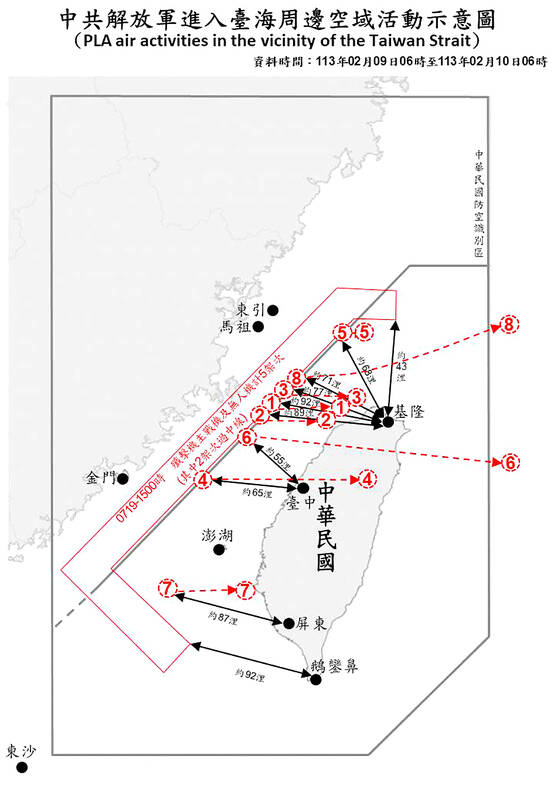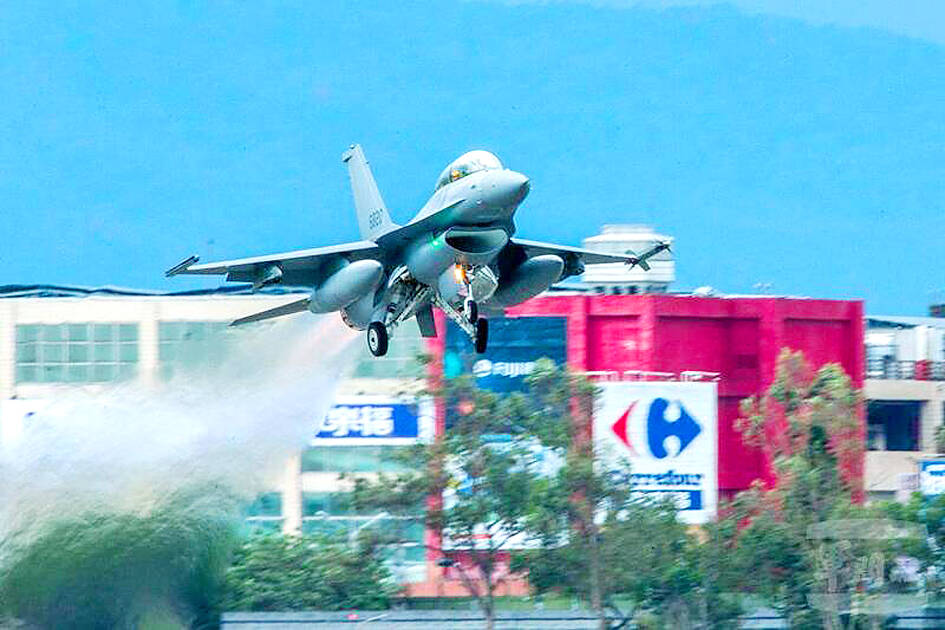A record eight Chinese balloons were detected around Taiwan on Friday, with two flying directly over the nation, the Ministry of National Defense (MND) said yesterday.
The balloons were spotted on Lunar New Year’s Eve at altitudes of 4,572m to 11,582m, it said.
The first one was seen on Friday morning and the last one early in the evening, the ministry said in its daily report on Chinese military activities.

Photo courtesy of the Ministry of National Defense
Two crossed the northern part of Taiwan, a map provided by the ministry showed. The others approached the coast before vanishing, although one flew over the sea to the north of Taiwan.
The Chinese government has repeatedly brushed off Taiwanese concerns about the balloons, saying they are weather balloons and should not be hyped up for political reasons.
The potential for China to use balloons for spying became a global issue in February last year when the US shot down what it said was a Chinese surveillance balloon.

Photo courtesy of the Military News Agency
Beijing said the balloon was a civilian aircraft that accidentally drifted astray.
China has ramped up military pressure against Taiwan in recent years, deploying warplanes and naval vessels on a nearly daily basis.
Since the presidential and legislative elections on Jan. 13, the largest Chinese incursions included 33 Chinese warplanes detected around Taiwan.
The largest number of warplanes China has sent during a 24-hour window came in September last year, when Taiwan recorded 103 Chinese aircraft around the nation.
Despite the Lunar New Year holiday, Taiwan’s air force remains on high alert, and its fighter jets and anti-air missiles are ready for deployment at a moment’s notice to defend the nation, the state-run Military News Agency said in a report yesterday.
The report highlighted the role of the defensive wing of fighters assigned to Penghu, known as taskforce Tian Jyu (天駒), or “Sky Stallion.”
The task force is on round-the-clock alert to scramble fighter jets and intercept foreign incursions, the report said.
The task force must be combat-ready when it takes off from Penghu, a First Tactical Fighter Wing major surnamed Wu (吳) was quoted as saying.
“Every second counts for the air force,” he said.
The distance from Magong Air Force Base to the median line of the Taiwan Strait is very short, putting pilots under tremendous pressure as they have very little time to prepare when needed, Wu said.
Still, the pilots are trained to handle such situations and are ready to deal with all types of harassment tactics, enabling them to keep calm and observe procedure and protocol when intercepting jets from the Chinese People’s Liberation Army Air Force, Wu said.
The median line serves as an unofficial barrier between Taiwan and China which Chinese planes now regularly fly over.
The units operating the anti-air batteries are also on alert throughout the Lunar New Year holiday, Wu said, adding that these units have been drilled and know where to go and prime the Tien Kung (天弓), or “Sky Bow,” anti-air missiles for possible launch.
The anti-air missile unit’s deputy commander, a Technical Sergeant surnamed Chang (張), said he had witnessed many challenges during his time with the military and has come to understand that serving in the military involves sacrifice.
The anti-air units carry out regular training and maintenance and are on the alert for any possible situation, he said.
He also thanked his family for their understanding and support, as “there are no holidays for the anti-air units.”

An essay competition jointly organized by a local writing society and a publisher affiliated with the Chinese Communist Party (CCP) might have contravened the Act Governing Relations Between the People of the Taiwan Area and the Mainland Area (臺灣地區與大陸地區人民關係條例), the Mainland Affairs Council (MAC) said on Thursday. “In this case, the partner organization is clearly an agency under the CCP’s Fujian Provincial Committee,” MAC Deputy Minister and spokesperson Liang Wen-chieh (梁文傑) said at a news briefing in Taipei. “It also involves bringing Taiwanese students to China with all-expenses-paid arrangements to attend award ceremonies and camps,” Liang said. Those two “characteristics” are typically sufficient

A magnitude 5.9 earthquake that struck about 33km off the coast of Hualien City was the "main shock" in a series of quakes in the area, with aftershocks expected over the next three days, the Central Weather Administration (CWA) said yesterday. Prior to the magnitude 5.9 quake shaking most of Taiwan at 6:53pm yesterday, six other earthquakes stronger than a magnitude of 4, starting with a magnitude 5.5 quake at 6:09pm, occurred in the area. CWA Seismological Center Director Wu Chien-fu (吳健富) confirmed that the quakes were all part of the same series and that the magnitude 5.5 temblor was

The brilliant blue waters, thick foliage and bucolic atmosphere on this seemingly idyllic archipelago deep in the Pacific Ocean belie the key role it now plays in a titanic geopolitical struggle. Palau is again on the front line as China, and the US and its allies prepare their forces in an intensifying contest for control over the Asia-Pacific region. The democratic nation of just 17,000 people hosts US-controlled airstrips and soon-to-be-completed radar installations that the US military describes as “critical” to monitoring vast swathes of water and airspace. It is also a key piece of the second island chain, a string of

The Central Weather Administration has issued a heat alert for southeastern Taiwan, warning of temperatures as high as 36°C today, while alerting some coastal areas of strong winds later in the day. Kaohsiung’s Neimen District (內門) and Pingtung County’s Neipu Township (內埔) are under an orange heat alert, which warns of temperatures as high as 36°C for three consecutive days, the CWA said, citing southwest winds. The heat would also extend to Tainan’s Nansi (楠西) and Yujing (玉井) districts, as well as Pingtung’s Gaoshu (高樹), Yanpu (鹽埔) and Majia (瑪家) townships, it said, forecasting highs of up to 36°C in those areas